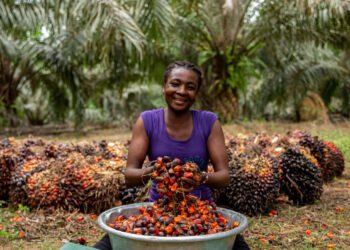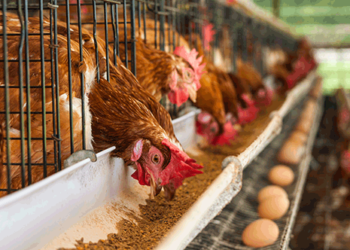Hon. John Dumelo, Deputy Minister for Food and Agriculture, has outlined Ghana’s ambitious strategy to transform the nation’s agricultural sector through technology, mechanization, and value-chain development. Speaking on the government’s vision for agriculture, he emphasized that efficiency is central to both productivity and profitability.
“Efficiency drives productivity. It drives profitability. With these interventions, we’re not just planting crops, we’re building the future of Ghana’s agriculture,” he said, highlighting the administration’s commitment to modernizing farming across the country.
A cornerstone of this transformation is the Feed Ghana program, designed to equip both institutional and smallholder farmers with essential tools and knowledge. The program seeks to enhance productivity, ensure sustainability, and improve income for farmers while integrating modern practices.
According to the Deputy Minister, this year, the Ministry of Food and Agriculture will establish 50 farm service centers nationwide, providing critical access to tractors, combine harvesters, irrigation systems, improved seeds, and expert agricultural guidance.
He explained that these centers aim to decentralize support, ensuring even remote farmers receive the resources needed to maximize productivity. He noted that the government is also simultaneously addressing post-harvest losses through strategic processing facilities.

Hon. Dumelo cited the recently commissioned tomato processing factory in Agogo, which converts surplus harvests into paste and ketchup, while similar initiatives for onions are underway. These measures aim to “reduce post-harvest losses, currently estimated at 40%, to below 15% in the near future.”
“Technology is at the heart of this agricultural revolution,” Hon. Dumelo said, highlighting that AI-driven tools like FarmSense allow farmers to analyze soil composition and optimize fertilizer use, while modern tractors and irrigation systems employ AI to manage water and nutrients effectively.
He further revealed that tailored solutions are designed for each region’s specific soil and climatic conditions, improving yields and operational efficiency across Ghana.
Investments Across Other Sectors
Other agricultural sectors, including poultry, fisheries, and oil palm plantations, are being strengthened to create jobs and reduce import dependence.
Hon. Dumelo noted that the “oil palm initiative,” alone is projected to generate over 250,000 jobs while producing locally refined edible oils, reinforcing Ghana’s capacity to meet domestic demand and expand exports.

“Ghana’s agricultural transformation is not only about increasing output, it’s about creating a resilient, modern, and profitable sector that can attract youth participation, reduce reliance on imports, and build export capacity”
Hon. John Dumelo, Deputy Minister for Food and Agriculture
In reinforcing national pride and consumer responsibility, Hon. Dumelo urged Ghanaians to prioritize locally produced goods.
“We should be happy to go to the market and say we’re buying made in Ghana chicken instead of the foreign breed – which we do not even know when it was killed,” he stated, emphasizing the role of consumer choices in supporting local farmers.
While the cedi has strengthened, cocoa farmers reportedly have not fully benefited, prompting targeted interventions to boost their productivity and income. The Deputy Minister underlined the importance of empowering these farmers through incentives and input support such as ”free fertilizers and seeds.”
“We want to give our cocoa farmers the necessary incentives to empower them,” Hon. Dumelo added, reiterating the government’s commitment to supporting Ghana’s primary agricultural export.
The Deputy Minister explained that the Ministry’s strategy is anchored on integrating modern technology, mechanization, and value-chain innovation to build a sustainable, profitable, and export-oriented agricultural sector.

By promoting Made-in-Ghana products and reducing import reliance, the government hopes to strengthen the economy, create jobs, and position Ghana as a model for agricultural efficiency in West Africa.
Ghana must eat what we grow. It is a matter of national pride,” Hon. Dumelo affirmed, calling for collective action from farmers, consumers, and policymakers alike.
READ ALSO: 2026 Budget Targets Nationwide Electricity Acceleration























